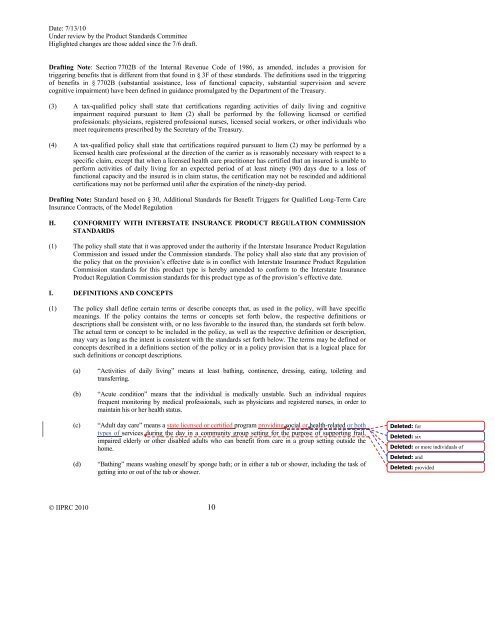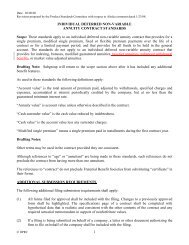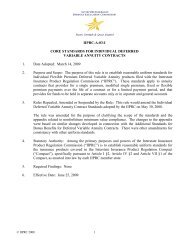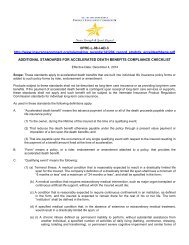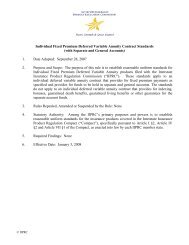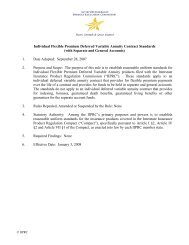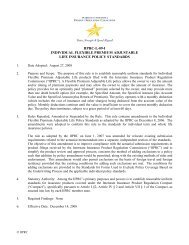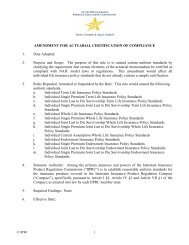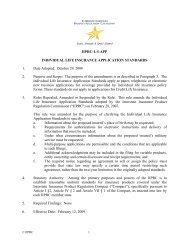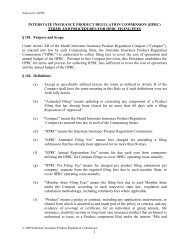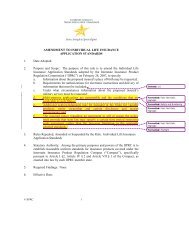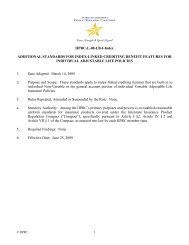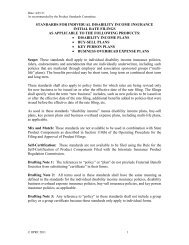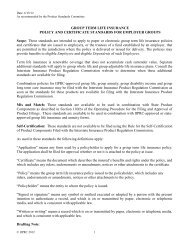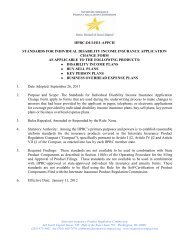core standards for individual long term care insurance policies
core standards for individual long term care insurance policies
core standards for individual long term care insurance policies
You also want an ePaper? Increase the reach of your titles
YUMPU automatically turns print PDFs into web optimized ePapers that Google loves.
Date: 7/13/10<br />
Under review by the Product Standards Committee<br />
Higlighted changes are those added since the 7/6 draft.<br />
Drafting Note: Section 7702B of the Internal Revenue Code of 1986, as amended, includes a provision <strong>for</strong><br />
triggering benefits that is different from that found in § 3F of these <strong>standards</strong>. The definitions used in the triggering<br />
of benefits in § 7702B (substantial assistance, loss of functional capacity, substantial supervision and severe<br />
cognitive impairment) have been defined in guidance promulgated by the Department of the Treasury.<br />
(3) A tax-qualified policy shall state that certifications regarding activities of daily living and cognitive<br />
impairment required pursuant to Item (2) shall be per<strong>for</strong>med by the following licensed or certified<br />
professionals: physicians, registered professional nurses, licensed social workers, or other <strong>individual</strong>s who<br />
meet requirements prescribed by the Secretary of the Treasury.<br />
(4) A tax-qualified policy shall state that certifications required pursuant to Item (2) may be per<strong>for</strong>med by a<br />
licensed health <strong>care</strong> professional at the direction of the carrier as is reasonably necessary with respect to a<br />
specific claim, except that when a licensed health <strong>care</strong> practitioner has certified that an insured is unable to<br />
per<strong>for</strong>m activities of daily living <strong>for</strong> an expected period of at least ninety (90) days due to a loss of<br />
functional capacity and the insured is in claim status, the certification may not be rescinded and additional<br />
certifications may not be per<strong>for</strong>med until after the expiration of the ninety-day period.<br />
Drafting Note: Standard based on § 30, Additional Standards <strong>for</strong> Benefit Triggers <strong>for</strong> Qualified Long-Term Care<br />
Insurance Contracts, of the Model Regulation<br />
H. CONFORMITY WITH INTERSTATE INSURANCE PRODUCT REGULATION COMMISSION<br />
STANDARDS<br />
(1) The policy shall state that it was approved under the authority if the Interstate Insurance Product Regulation<br />
Commission and issued under the Commission <strong>standards</strong>. The policy shall also state that any provision of<br />
the policy that on the provision’s effective date is in conflict with Interstate Insurance Product Regulation<br />
Commission <strong>standards</strong> <strong>for</strong> this product type is hereby amended to con<strong>for</strong>m to the Interstate Insurance<br />
Product Regulation Commission <strong>standards</strong> <strong>for</strong> this product type as of the provision’s effective date.<br />
I. DEFINITIONS AND CONCEPTS<br />
(1) The policy shall define certain <strong>term</strong>s or describe concepts that, as used in the policy, will have specific<br />
meanings. If the policy contains the <strong>term</strong>s or concepts set <strong>for</strong>th below, the respective definitions or<br />
descriptions shall be consistent with, or no less favorable to the insured than, the <strong>standards</strong> set <strong>for</strong>th below.<br />
The actual <strong>term</strong> or concept to be included in the policy, as well as the respective definition or description,<br />
may vary as <strong>long</strong> as the intent is consistent with the <strong>standards</strong> set <strong>for</strong>th below. The <strong>term</strong>s may be defined or<br />
concepts described in a definitions section of the policy or in a policy provision that is a logical place <strong>for</strong><br />
such definitions or concept descriptions.<br />
(a)<br />
(b)<br />
(c)<br />
(d)<br />
“Activities of daily living” means at least bathing, continence, dressing, eating, toileting and<br />
transferring.<br />
“Acute condition” means that the <strong>individual</strong> is medically unstable. Such an <strong>individual</strong> requires<br />
frequent monitoring by medical professionals, such as physicians and registered nurses, in order to<br />
maintain his or her health status.<br />
“Adult day <strong>care</strong>” means a state licensed or certified program providing social or health-related or both<br />
types of services during the day in a community group setting <strong>for</strong> the purpose of supporting frail,<br />
impaired elderly or other disabled adults who can benefit from <strong>care</strong> in a group setting outside the<br />
home.<br />
“Bathing” means washing oneself by sponge bath; or in either a tub or shower, including the task of<br />
getting into or out of the tub or shower.<br />
Deleted: <strong>for</strong><br />
Deleted: six<br />
Deleted: or more <strong>individual</strong>s of<br />
Deleted: and<br />
Deleted: provided<br />
© IIPRC 2010 10


